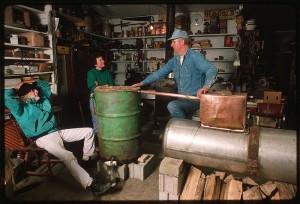If It’s Legal, Is It Moonshine?
Contributed by on Feb 11, 2014
Zero readers love this post.
By Richard Thomas
While illegal moonshining dominates the airwaves, it’s legal moonshine that has a growing presence on liquor store and bar shelves. Yet purists object to the very idea of any product made for retail sale being labeled “moonshine,” insisting that the term applies only to illegally made spirits. According to them, anything with taxes paid and calling itself moonshine is a fake.
As The Whiskey Reviewer pointed out in its guide to moonshine, the truth is not so open and shut. On the one hand, the etymology of moonshine points to its meaning “illegal liquor” at least as far back 1785, when it referred to brandy smuggled into England. Many dictionaries also define moonshine primarily by its illegality.
Yet the word “moonshine” has been used to refer to perfectly legal, albeit still homemade, liquor in the past. Thomas Jefferson repealed the much-despised Whiskey Tax in 1802, and the U.S. government did not reinstate a tax on spirituous liquor until 1862, doing so as a revenue measure for the Civil War. For 60 years, the only laws, if any, preventing farmers from distilling their own produce were strictly local, and many were making whiskey and other spirits for sale and/or home consumption in perfect harmony with the law. They kept on calling their unaged spirits moonshine, among other things.
The meaning of the word “moonshine” has evolved over time, and more to the point has proven quite fluid. In the American context, legal and illegal spirits that qualify as applejack, rum, vodka, and whiskey have all gone under the label of moonshine. Nowadays, a number of micro-distilleries are in the business of legally making corn whiskey, sugar-spiked corn whiskey, and all-sugar ‘shine, and calling it moonshine. All things considered, I fail to see why anyone should take serious issue with that.
Pundits like Clay Risen and Chuck Cowdery will continue to sneer at legal moonshine, and purists will continue to insist on a very narrow definition of moonshine. They are entitled to their opinions, of course, but not to present those opinions as if they were fact. Worse still is presenting inaccurate and misleading information to support a case, as Risen did when he wrongly claimed that most historical American moonshine was made from fruit, rather than corn, sugar, or a mix of corn and sugar.
Neither law, definition, tradition, nor history prevents a legal distillery from making a product that follows along the lines of traditional moonshine recipes and calling it moonshine. More people would do well to remember it.

